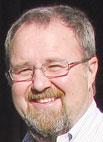
Mark Green, left, has received many accolades from his peers for his work in grassland management. Bruce Shanks, right, of Lincoln University, and president of the Missouri Forage and Grassland Council, presents Mark with the group’s 2019 Grasslander Award.
Mark Green is possibly the most highly respected pasture management specialist to ever throw up a high-tensile electric fence.
In January, he was recognized by the American Forage and Grassland Council as the 2019 Pastureland Conservationist of the Year. Just two months prior to that presentation in Greenville, S.C., he was similarly honored by the Missouri Forage and Grassland Council.
A 39-year veteran of USDA’s Natural Resources Conservation Service (NRCS), Green is today the department’s lead resource conservationist in Springfield, widely recognized among cattlemen as the area’s preeminent pasture planning and management specialist.
In nominating Mark for national honors, Diana Sheridan, district conservationist for NRCS in Springfield, stated he coordinates grazing schools for producers, writes instructive books, trains our staff, and has even taught seminars for several Midwest universities and groups in other countries. He has developed and helped implement more than 700 resource conservation plans and livestock grazing systems throughout his career.
In addition to working with individual landowners, Green has helped the William H. Darr College of Agriculture at Missouri State University develop and implement a grazing school class, and he works with University of Missouri Extension and MSU professors to teach intensive grazing management and strategies.
Additionally, Green helped NRCS develop several publications, such as “Missouri Watering Systems for Serious Graziers” and “Missouri Electric Fencing for Serious Graziers.”
Still a Westerner
Though decades removed from his ranching youth, Green remains distinctively a Westerner in his boots, jeans and broad-brimmed hat when leading a regional grazing school class or speaking to a gathering of Ozarks cattlemen – and producers discern intuitively he’s one cowboy who’s not “all hat.”
Mark has shared his expertise in electric fencing, livestock watering systems and pasture management with cattle producers in Oklahoma, as well as Kansas and Missouri. He has even helped farmers and ranchers in Guatemala.
As a student in Denver’s Westminster High School – where he met his future wife, Jill Sheffer – Mark had his sights set on a ranch management program at Texas Christian University in Fort Worth.
In 1979, however, Green moved with his family to Lockwood, Mo., to work for the Haubein Farms beef and row crop operation.
Green worked for a year and a half at Haubeins, “Still with an eye toward starting the ranch management program at TCU, but the good Lord had other plans for me.”
Those plans included commuting from Lockwood to Springfield for a year to take night classes at Missouri State University. Tiring of that “back and forth,” the Greens moved to Springfield, where Jill continued to work as a bookkeeper at Builders Rebar, where she remains the bookkeeper today. Mark attended classes and worked – construction jobs, hanging garage doors and cleaning barns at the Midwest Breeders bull farm on South Campbell (now the site of Academy Sports, etc.). “I like to say I went to college on the ‘wife’ scholarship,” he said.
Grassland career began with old SCS
In 1983, Mark graduated MSU with a degree in agronomy, and in the meantime worked for three years as an intern under Ian Kurtz at the Soil Conservation Service (NRCS today) center in Ozark. It was during that internship he decided he wanted to be a grassland specialist – not really a far stretch from his ambitions to become a rancher.
Upon graduation from MSU, Mark was sent to Kingston, a small town in Caldwell County between Kansas City and Chillicothe.
“It was good for me, working the cropland country, ” Mark said. But in less than two years he was back in Ozark, where he remained for another eight years, and just on the back steps where he’s been based in Springfield for most of his career.
Mark and Jill also bought a place near Fair Grove three years ago where they contract graze beef cattle. The previous owner called it a farm, the Greens call it their ranch, the fruition of that ranching dream they’ve harbored for years. “God just dumped this place in our lap,” Mark said.
A place of their own gives Mark an enhanced opportunity to practice what he’s been preaching for more than 30 years.
“Our job is to help producers improve their places,” he said. For some 30 years he was the district supervisor for NRCS, and only recently gave up some of his supervisory chores to work more closely with producers in designing grazing systems, coordinating grazing schools and training new soil and resource conservationists.
“I was blessed with a great staff.” And he genuinely appreciates the farmers and ranchers he works with. “After every grazing school people say they got lot of good out of it. It’s not just about qualifying for program payments. They enjoy them.”
It’s the same for Mark.
“I really enjoy grazing and grassland management – how it all fits together. I feel blessed to be able to do this work in grassland management. That’s where my roots are.”







